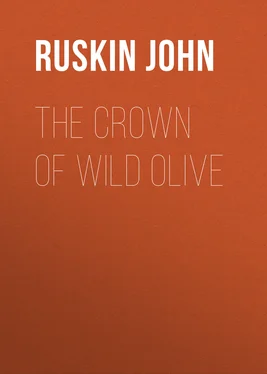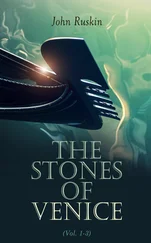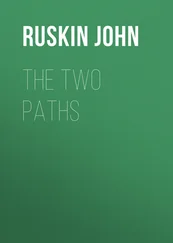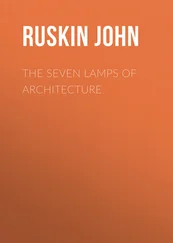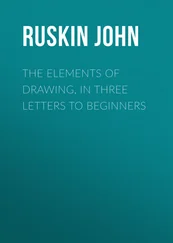John Ruskin - The Crown of Wild Olive
Здесь есть возможность читать онлайн «John Ruskin - The Crown of Wild Olive» — ознакомительный отрывок электронной книги совершенно бесплатно, а после прочтения отрывка купить полную версию. В некоторых случаях можно слушать аудио, скачать через торрент в формате fb2 и присутствует краткое содержание. Жанр: foreign_antique, foreign_home, literature_19, visual_arts, на английском языке. Описание произведения, (предисловие) а так же отзывы посетителей доступны на портале библиотеки ЛибКат.
- Название:The Crown of Wild Olive
- Автор:
- Жанр:
- Год:неизвестен
- ISBN:нет данных
- Рейтинг книги:4 / 5. Голосов: 1
-
Избранное:Добавить в избранное
- Отзывы:
-
Ваша оценка:
- 80
- 1
- 2
- 3
- 4
- 5
The Crown of Wild Olive: краткое содержание, описание и аннотация
Предлагаем к чтению аннотацию, описание, краткое содержание или предисловие (зависит от того, что написал сам автор книги «The Crown of Wild Olive»). Если вы не нашли необходимую информацию о книге — напишите в комментариях, мы постараемся отыскать её.
The Crown of Wild Olive — читать онлайн ознакомительный отрывок
Ниже представлен текст книги, разбитый по страницам. Система сохранения места последней прочитанной страницы, позволяет с удобством читать онлайн бесплатно книгу «The Crown of Wild Olive», без необходимости каждый раз заново искать на чём Вы остановились. Поставьте закладку, и сможете в любой момент перейти на страницу, на которой закончили чтение.
Интервал:
Закладка:
Let us, then, enquire together what sort of games the playing class in England spend their lives in playing at.
The first of all English games is making money. That is an all-absorbing game; and we knock each other down oftener in playing at that than at foot-ball, or any other roughest sport; and it is absolutely without purpose; no one who engages heartily in that game ever knows why. Ask a great money-maker what he wants to do with his money—he never knows. He doesn't make it to do anything with it. He gets it only that he may get it. 'What will you make of what you have got?' you ask. 'Well, I'll get more,' he says. Just as, at cricket, you get more runs. There's no use in the runs, but to get more of them than other people is the game. And there's no use in the money, but to have more of it than other people is the game. So all that great foul city of London there,—rattling, growling, smoking, stinking,—a ghastly heap of fermenting brick-work, pouring out poison at every pore,—you fancy it is a city of work? Not a street of it! It is a great city of play; very nasty play, and very hard play, but still play. It is only Lord's cricket ground without the turf,—a huge billiard table without the cloth, and with pockets as deep as the bottomless pit; but mainly a billiard table, after all.
Well, the first great English game is this playing at counters. It differs from the rest in that it appears always to be producing money, while every other game is expensive. But it does not always produce money. There's a great difference between 'winning' money and 'making' it; a great difference between getting it out of another man's pocket into ours, or filling both. Collecting money is by no means the same thing as making it; the tax-gatherer's house is not the Mint; and much of the apparent gain (so called), in commerce, is only a form of taxation on carriage or exchange.
Our next great English game, however, hunting and shooting, is costly altogether; and how much we are fined for it annually in land, horses, gamekeepers, and game laws, and all else that accompanies that beautiful and special English game, I will not endeavour to count now: but note only that, except for exercise, this is not merely a useless game, but a deadly one, to all connected with it. For through horse-racing, you get every form of what the higher classes everywhere call 'Play,' in distinction from all other plays; that is—gambling; by no means a beneficial or recreative game: and, through game-preserving, you get also some curious laying out of ground; that beautiful arrangement of dwelling-house for man and beast, by which we have grouse and black-cock—so many brace to the acre, and men and women—so many brace to the garret. I often wonder what the angelic builders and surveyors—the angelic builders who build the 'many mansions' up above there; and the angelic surveyors, who measured that four-square city with their measuring reeds—I wonder what they think, or are supposed to think, of the laying out of ground by this nation, which has set itself, as it seems, literally to accomplish, word for word, or rather fact for word, in the persons of those poor whom its Master left to represent him, what that Master said of himself—that foxes and birds had homes, but He none.
Then, next to the gentlemen's game of hunting, we must put the ladies' game of dressing. It is not the cheapest of games. I saw a brooch at a jeweller's in Bond Street a fortnight ago, not an inch wide, and without any singular jewel in it, yet worth 3,000 l. And I wish I could tell you what this 'play' costs, altogether, in England, France, and Russia annually. But it is a pretty game, and on certain terms, I like it; nay, I don't see it played quite as much as I would fain have it. You ladies like to lead the fashion:—by all means lead it—lead it thoroughly, lead it far enough. Dress yourselves nicely, and dress everybody else nicely. Lead the fashions for the poor first; make them look well, and you yourselves will look, in ways of which you have now no conception, all the better. The fashions you have set for some time among your peasantry are not pretty ones; their doublets are too irregularly slashed, and the wind blows too frankly through them.
Then there are other games, wild enough, as I could show you if I had time.
There's playing at literature, and playing at art—very different, both, from working at literature, or working at art, but I've no time to speak of these. I pass to the greatest of all—the play of plays, the great gentlemen's game, which ladies like them best to play at,—the game of War. It is entrancingly pleasant to the imagination; the facts of it, not always so pleasant. We dress for it, however, more finely than for any other sport; and go out to it, not merely in scarlet, as to hunt, but in scarlet and gold, and all manner of fine colours: of course we could fight better in grey, and without feathers; but all nations have agreed that it is good to be well dressed at this play. Then the bats and balls are very costly; our English and French bats, with the balls and wickets, even those which we don't make any use of, costing, I suppose, now about fifteen millions of money annually to each nation; all of which, you know is paid for by hard labourer's work in the furrow and furnace. A costly game!—not to speak of its consequences; I will say at present nothing of these. The mere immediate cost of all these plays is what I want you to consider; they all cost deadly work somewhere, as many of us know too well. The jewel-cutter, whose sight fails over the diamonds; the weaver, whose arm fails over the web; the iron-forger, whose breath fails before the furnace— they know what work is—they, who have all the work, and none of the play, except a kind they have named for themselves down in the black north country, where 'play' means being laid up by sickness. It is a pretty example for philologists, of varying dialect, this change in the sense of the word 'play,' as used in the black country of Birmingham, and the red and black country of Baden Baden. Yes, gentlemen, and gentlewomen, of England, who think 'one moment unamused a misery, not made for feeble man,' this is what you have brought the word 'play' to mean, in the heart of merry England! You may have your fluting and piping; but there are sad children sitting in the market-place, who indeed cannot say to you, 'We have piped unto you, and ye have not danced:' but eternally shall say to you, 'We have mourned unto you, and ye have not lamented.'
This, then, is the first distinction between the 'upper and lower' classes. And this is one which is by no means necessary; which indeed must, in process of good time, be by all honest men's consent abolished. Men will be taught that an existence of play, sustained by the blood of other creatures, is a good existence for gnats and sucking fish; but not for men: that neither days, nor lives, can be made holy by doing nothing in them: that the best prayer at the beginning of a day is that we may not lose its moments; and the best grace before meat, the consciousness that we have justly earned our dinner. And when we have this much of plain Christianity preached to us again, and enough respect for what we regard as inspiration, as not to think that 'Son, go work to-day in my vineyard,' means 'Fool, go play to-day in my vineyard,' we shall all be workers, in one way or another; and this much at least of the distinction between 'upper' and 'lower' forgotten.
II. I pass then to our second distinction; between the rich and poor, between Dives and Lazarus,—distinction which exists more sternly, I suppose, in this day, than ever in the world, Pagan or Christian, till now. I will put it sharply before you, to begin with, merely by reading two paragraphs which I cut from two papers that lay on my breakfast table on the same morning, the 25th of November, 1864. The piece about the rich Russian at Paris is commonplace enough, and stupid besides (for fifteen francs,—12 s. 6 d. ,—is nothing for a rich man to give for a couple of peaches, out of season). Still, the two paragraphs printed on the same day are worth putting side by side.
Читать дальшеИнтервал:
Закладка:
Похожие книги на «The Crown of Wild Olive»
Представляем Вашему вниманию похожие книги на «The Crown of Wild Olive» списком для выбора. Мы отобрали схожую по названию и смыслу литературу в надежде предоставить читателям больше вариантов отыскать новые, интересные, ещё непрочитанные произведения.
Обсуждение, отзывы о книге «The Crown of Wild Olive» и просто собственные мнения читателей. Оставьте ваши комментарии, напишите, что Вы думаете о произведении, его смысле или главных героях. Укажите что конкретно понравилось, а что нет, и почему Вы так считаете.
